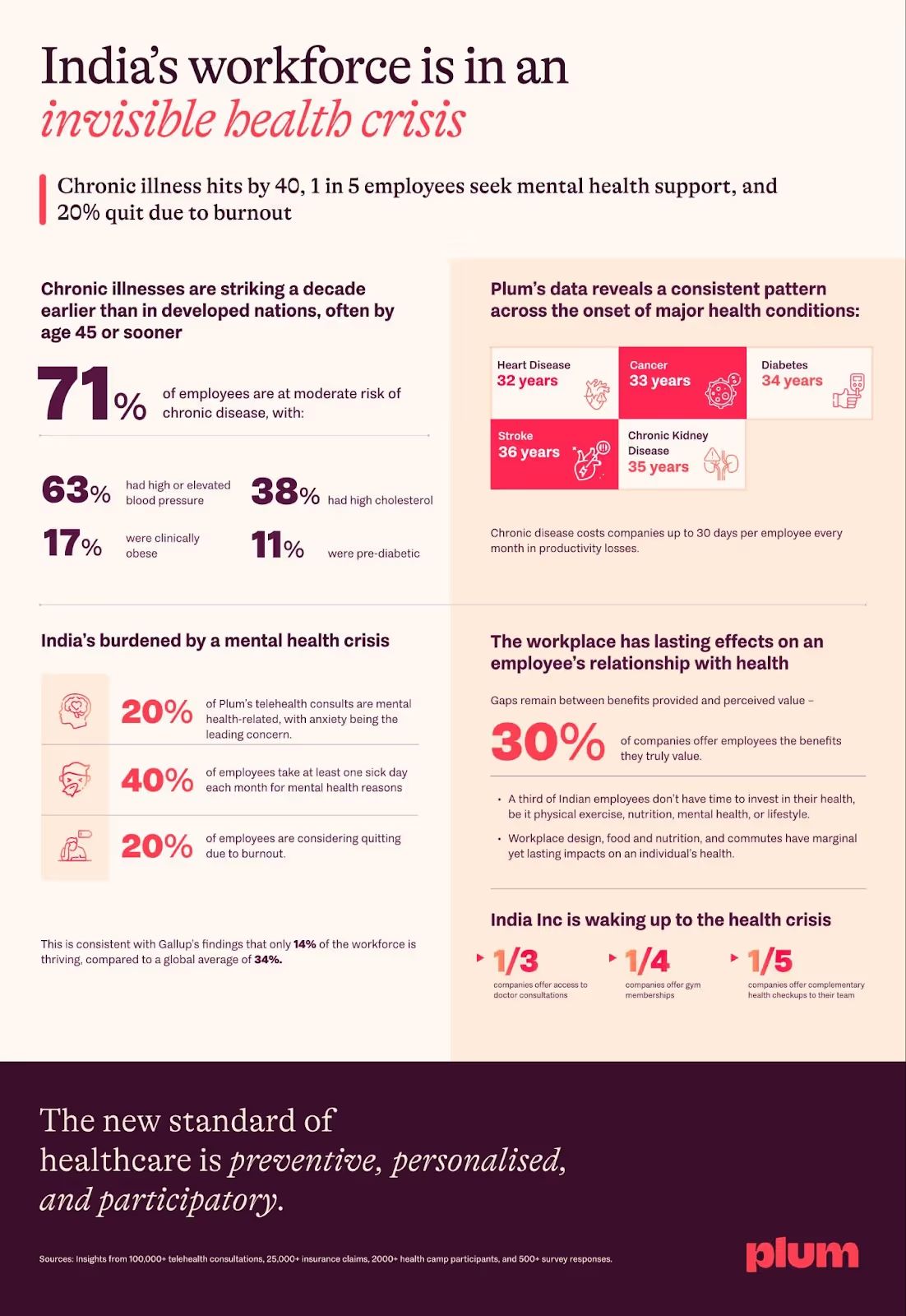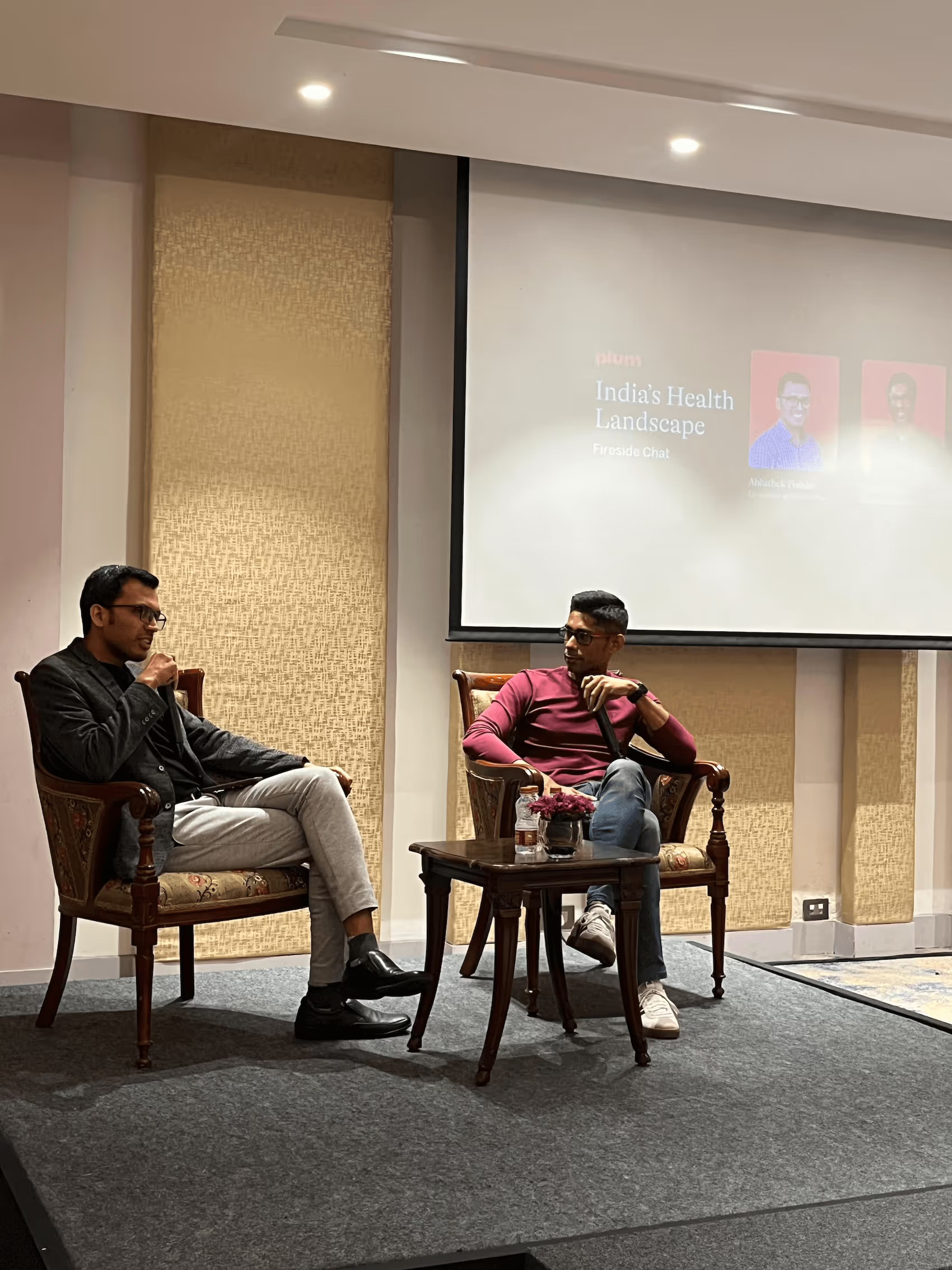Notes from my fireside chat with Dilip Kumar
We launched our flagship property, The Employee Health Report 2025, in the last week of May. This report was a commentary on the state of health among working India, observed from our vantage point earned from serving over 6000 companies and 600000 users.
It is a 102-page report, so I’ll leave with the snapshot as you hunt for a cup of coffee to read it with.

Some of these observations interested us, and we wanted to hear what our peers felt. So, we hosted an event with 120+ people leaders, founders, and healthcare experts to share our findings and insights. While Saurabh presented the top takeaways and all our data, I had the honour of hosting a fireside chat with Rainmatter’s Dilip Kumar about the subtleties of health and the role workplaces play.
If you follow him on social media, you’ll know that Dilip is no stranger to the subject. He’s invested in multiple healthcare startups and is an active proponent of a healthy lifestyle himself. Our conversation lasted a little over 30 minutes, and many aspects were discussed, but I’ll leave you with three points that stuck with me.
The two Indias, health edition
When I asked Dilip how he felt about the state of healthcare today, he told me that he was genuinely concerned. You could take any index from DALYs to hunger to child obesity rates, and you’ll notice that India is far behind our Western counterparts. Some of our findings back up his concerns – chronic ailments like diabetes, heart disease, and cancer manifest as early as our late 30s, and 71% of Indians display non-communicable disease risk.
On the other hand, a small fraction is incredibly health-conscious, but is overengineering based on what they consume on social media. For example, people today listen to a Huberman podcast and believe an ice bath could solve all their problems. Their diets are so protein-heavy that it leads to other issues like dehydration and kidney disease.
Both of these polarising approaches stem from a common issue – India, as a country, is not very health-aware. Our approach is still reactive, prioritising treatment over prevention.
3 out of 5 Indians have never booked a full-body health check-up. Fewer than 25% of companies offer it as a benefit to their teams. To truly win as a nation, we need to champion more proactive and participative health interventions.
Health is a very intrinsic, personal journey
Dilip did not invest in his health to run a marathon or get fitter. He did it to survive. His switch happened when he realised that health was, is, and will always be his biggest moat. This was a very intrinsic decision.
It was a no-brainer.
“We need to find our metric. Just like in your KPIs and KRAs, it should be a simple metric. My only metric today is staying in my four-year-old's life as long as possible. And I want to do everything he expects me to do. When he tells me to jump, I want to be jumping. When he tells me to run, I want to be running.”
At Plum, we often wonder about the adoption of our products. What can we do to get more folks to book a telehealth consultation? How do we nudge a user towards a health-related investment through perks? What is the best way to encourage employees to book a health check-up? A lot of this cannot be achieved through hacks, notifications, or ‘dark patterns’.
The best health outcomes are a result of consistent habits. We try to do this by making the user more health-aware through our content, through interactive health camps, or by enabling thoughtful user journeys.
Nobody can enable a positive health journey if the individual isn’t invested.
Workplace health starts from the top
I believe the workplace plays a very underrated role in our country’s infrastructure, and outcomes could go both ways.
We observed that most acute illnesses related to dermatology, nutrition, and infections arise from the workplace. India’s one of the most overworked countries in the world, and employees don’t have time to take care of their health. Most Indians show exposure to NCD risk factors thanks to behaviours normalised at the workplace.
But there is reason to be optimistic. The workplace is driving better health outcomes – be it encouraging health checkups, enabling gym subscriptions, or providing free access to doctors. We’ve observed a 100% increase in companies investing in preventive health, and every Rs.100 invested in health translates to Rs 296 saved by the employee on health spends.
However, Dilip believes, and I agree, that these changes need to come from the very top.
“What is key to you is your human capital. Your single biggest metric needs to be whether your employees are mentally and physically healthy.”
To ensure this, companies need an ecosystem that feeds knowledge, ideas, information, suggestions, opinions, and everything else. And the leaders need to choose what is good for their culture and teams.

India stands at a pivotal crossroads. Our workforce is young, ambitious, and poised to drive the country's next wave of economic growth. But beneath this promise lies a quiet crisis, one that threatens not only individual well-being but the future of India itself.
It all goes down to our next move.
.avif)










.avif)














